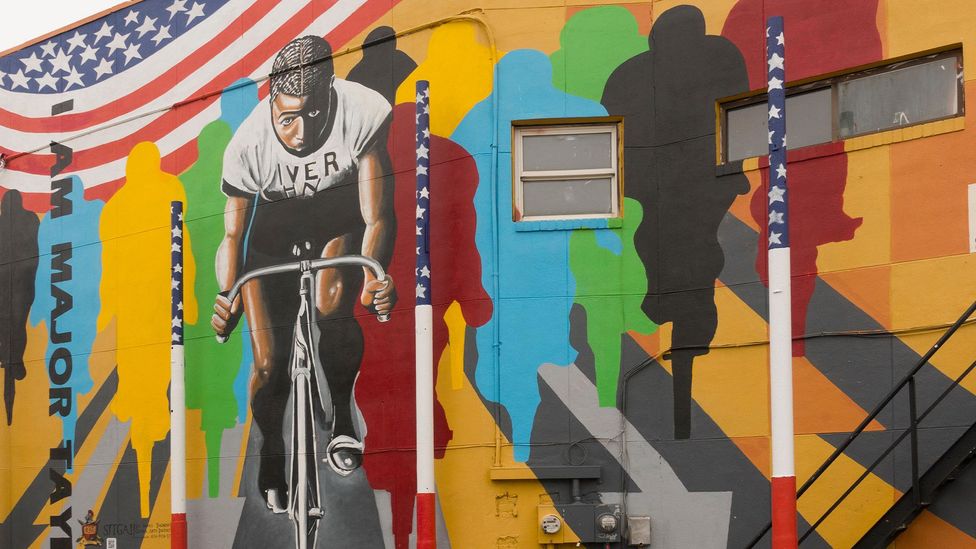On the wall of a tiny one-room museum in Worcester, Massachusetts, there's a black-and-white photo taken in 1901 of a man hunched over on his racing bicycle, eyes trained on the photographer. His fingers are clenched over the drop bars, his muscles bulging within his wool sweater and you can feel the intensity of his gaze.
Today, most people likely have no idea who this man is, but Marshall "Major" Taylor wasn't just a world champion at a time when cycling was one of the most popular international sports; he was also the first African American global sports superstar.
Rediscovering America is a BBC Travel series that tells the inspiring stories of forgotten, overlooked or misunderstood aspects of the US, flipping the script on familiar history, cultures and communities.
Taylor's unlikely rise to stardom took place at the height of Jim Crow oppression in the United States. Born in 1878, he was raised in Indianapolis, Indiana, the son of a Civil War veteran. As a child, he received a bicycle as a gift and began performing tricks in front of a local bike shop to attract customers. He sought to improve his cycling skills at a local YMCA, but they refused to train him because of the colour of his skin. Undaunted, he started competing in any race that would allow African Americans to compete and showed a precocious talent for short, high-intensity sprints.
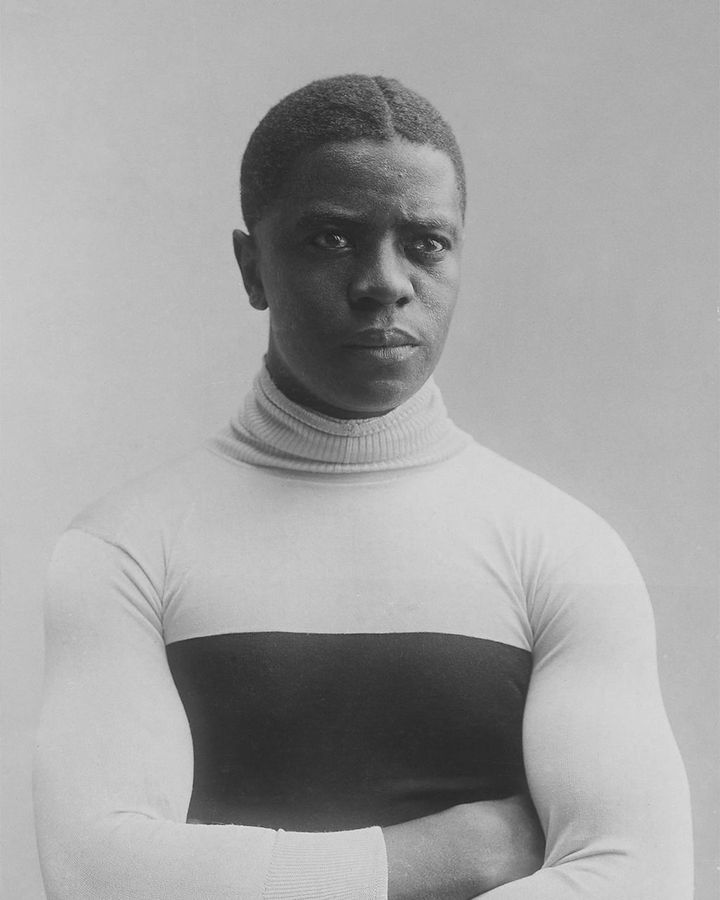
Taylor overcame Jim Crow-era racism to become a world champion cyclist (Credit: Jules Beau, Gallica Digital Library & public domain)
Taylor soon caught the attention of Louis "Birdie" Munger, a retired penny farthing bicycle racer and entrepreneur. Munger tested how fast Taylor could sprint a single mile and timed him at two minutes and nine seconds – only two seconds behind the world record in 1893. Munger became Taylor's mentor, sponsor and coach. In 1895, Munger invited a young Taylor to live in Worcester, Massachusetts, where Munger had opened a new bicycle factory. Unlike in Indianapolis, Taylor was allowed to join the YMCA in this more-progressive community, and it was here where he began training in earnest.
"Major Taylor lived in Worcester most of his life, from 1895 to 1930," said Lynne Tolman, director of the Major Taylor Association non-profit that honours his legacy. "The newspapers called him 'the Worcester Whirlwind'. There were still obstacles, to be sure, such as white neighbours' objections when Taylor bought a house in Worcester. But ultimately, Taylor made a comfortable home in Worcester, and Worcester remains justifiably proud that a local resident became an international sports superstar."
As journalist Michael Kranish chronicles in his 2019 biography The World's Fastest Man, Taylor became a legend in his day, winning countless track races and smashing world records. A devout Christian, Taylor cultivated a straight-edge personality, abstaining from alcohol and tobacco and refusing to compete on Sundays. Even by today's modern racing standards, his stats remain astonishing. In 1898, for example, he sprinted 1km in 57.6 seconds – the current record set by Dutch cyclist Jeffrey Hoogland is 55.433 seconds.
Still, Taylor faced unending hostility in his home country. In 1885, the US League of American Wheelmen (now known as the League of American Bicyclists) attempted to ban Black people. Newspapers published mocking caricatures of Taylor, and when he was allowed to compete, brass bands would play "Dixie" (which originated with racist minstrel shows in the 1850s and became the de facto anthem of the Confederacy during the US Civil War) when his name was announced. Advertisements framed Taylor's races as a battle between Black and white athletes, and opponents routinely used vicious tactics on the track, attempting to trap him in a group or dangerously upend his bike. During one race in Taunton, Massachusetts, a white racer pulled Taylor from his bike and choked him into unconsciousness.
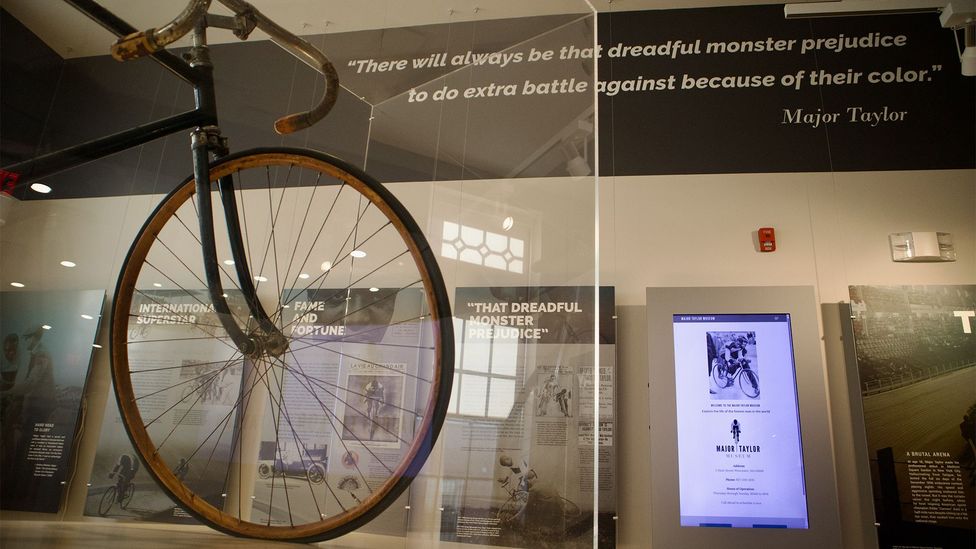
Because of the relentless racism he faced in the US, Taylor was often forced to compete abroad (Credit: Robert Isenberg)
As Jim Crow-era racial segregation intensified at the turn of the 20th Century, hotels and restaurants across the US refused to serve Taylor. As a result, promoters invited the athlete to race in Canada, Europe and Australia, where the press welcomed him and spectators packed the stands. Taylor helped popularise the "safety bicycle", the modern alternative to the dangerous penny farthings that preceded them. Yet, his breakneck racing schedule put a strain on his health and marriage, and sports writers scrutinised his every move.
Train like Taylor
There are a number of bike trails across the US named after Taylor – including one in Chicago. There is also a five-storey mural of Taylor in downtown Indianapolis and a smaller one of him in Richmond, Virginia. But Taylor developed his sprinting skill by practicing on Worcester's steep George Street, and each year the city holds the George Street Bike Challenge in his honour.
Like many athletes, Taylor faded into obscurity after retiring in 1910. A passionate writer, Taylor composed a 600-page memoir but failed to find a publisher, and lost money after deciding to self-publish it. Many of his pursuits, such as a degree in engineering and reinvention as a car salesman, petered out over time. Taylor moved to Chicago at the onset of the Great Depression and eventually died in 1932, penniless and forgotten. He was only 52 years old.
His story remained an obscure footnote until 1988 when author Andrew Ritchie revived interest in the athlete by writing the book Major Taylor: The Extraordinary Career of a Champion Bicycle Rider. The book helped propel Taylor to be inducted into the US Bicycling Hall of Fame in 1989. It also inspired the creation of The Major Taylor Association in Worcester to "recognize sportsmanship, promote nonviolence, and care for those less fortunate". The Association erected a statue of Taylor in 2008 which now stands in front of the Worcester Public Library, just down the street from the one-room museum dedicated to him.
"Since the statue effort began, Major Taylor cycling clubs have sprouted across the country, with a few overseas," said Tolman. "More than 80 cycling clubs, many of them named for Major Taylor, have supported the Major Taylor Association's efforts financially. The clubs are the organisation's ambassadors, helping to educate people in their communities about the champion's life and legacy."
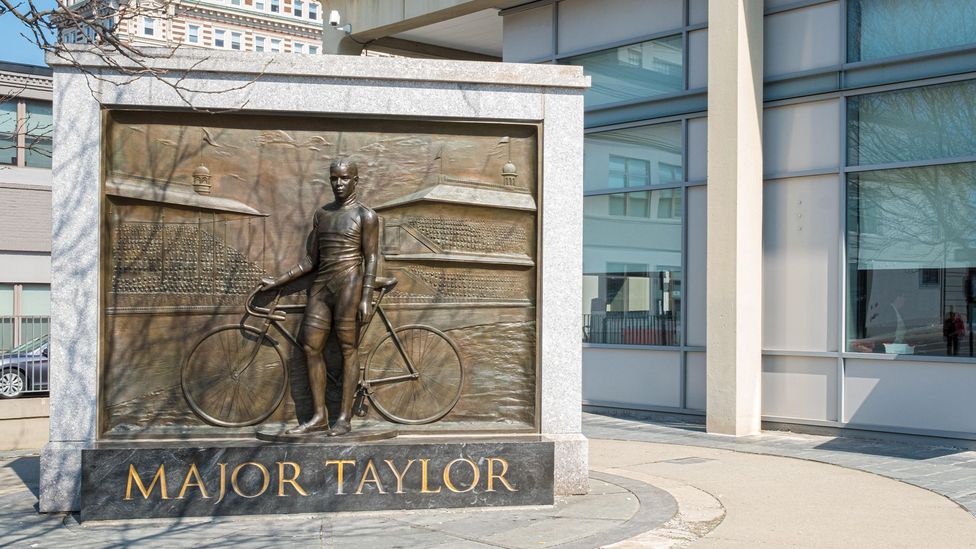
A statue of Taylor now stands outside the Worcester Public Library (Credit: Norman Eggert/Alamy)
Yet, more lofty honours may still be coming. The US House of Representatives is currently considering a bill that would award Taylor the Congressional Gold Medal, the highest civilian honour US citizens can receive. Were Taylor to receive it, he would become just the 17th African American in history to receive the award.
"It is without question that Marshall 'Major' Taylor was a man before his time, a stellar athlete, a leader in the field of cycling, and a trailblazer. I believe it is fitting that Congress award the 'world's fastest man' one of our nation's most prestigious honours," said Representative Jonathan L Jackson, the son of Civil Rights leader Jesse Jackson and the godson of Martin Luther King, Jr in a press release, who introduced the bipartisan bill alongside 32 other members of Congress in December.
"[Taylor] was a man of great character and sportsmanship," said Cyrille Vincent, a documentary filmmaker based in Worcester. "I believe that is the reason we still talk about him more than 100 years after. You have to be a great athlete, but beyond that, he was able to stand against injustice, tremendous adversity, and keep his cool."
Vincent is currently directing a feature documentary, Whirlwind, about Taylor's life, a project that has become deeply personal. Originally from the Central African Republic, Vincent settled in Worcester in 2016. He lived near Major Taylor Boulevard and drove along the street hundreds of times. But learning the story behind its namesake sparked an obsessive interest in the historical figure – and even inspired him to take up cycling himself.
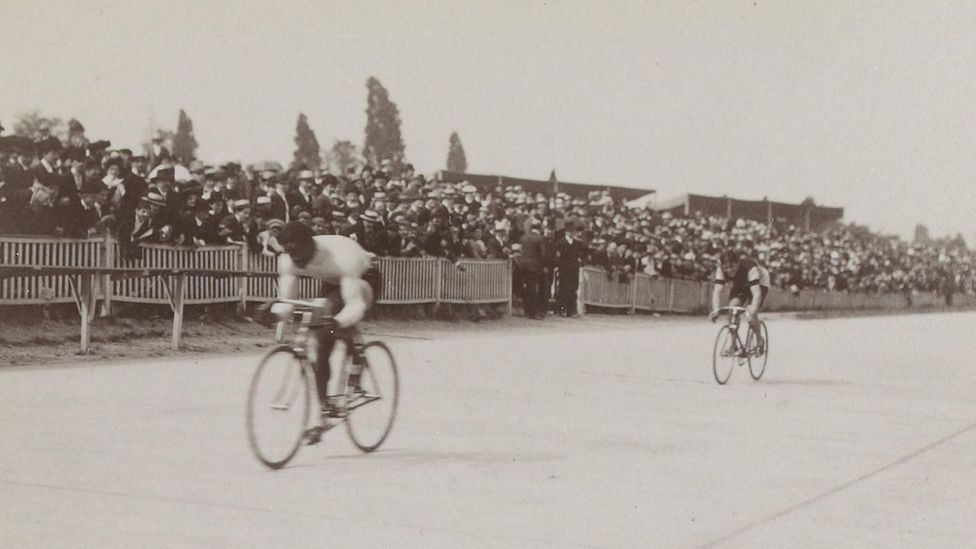
Congress is currently considering a bill that would award Taylor the Congressional Gold Medal (Credit: The Picture Art Collection/Alamy)
A few steps away from his namesake boulevard, The Major Taylor Museum opened in October 2021 in Worcester's former courthouse. The one-room exhibit is beautifully curated: archival photographs have been blown up and arranged along the brick walls, and artefacts include a period racing bike – under glass – and a French magazine from the era covering one of his European tours. There are explanatory plaques everywhere, while touch-screens and a pair of stationary bicycles help visitors interact with history.
"Our visitors run the gamut," said Sharon Freed, the museum's manager. "Cyclists know Major's story more than anyone else, so we see quite a few riders. We see professionals who used to work in the building – when it was still the city's courthouse – parents with their young children, elementary and college students, university faculty and staff, non-profit leaders, city and state officials, tourists and others."
"To the best of our knowledge, there is no other place like this," she added.
A fitting tribute to a man whose unique story is unrivalled.
---
Join more than three million BBC Travel fans by liking us on Facebook, or follow us on Twitter and Instagram.
If you liked this story, sign up for the weekly bbc.com features newsletter called "The Essential List". A handpicked selection of stories from BBC Future, Culture, Worklife and Travel, delivered to your inbox every Friday.
